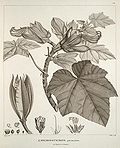Alexander von Humboldt

Alexander von Humboldt [1] (Berlin, 14 September 1769 – Berlin, 6 May 1859) was a Prussian naturalist and explorer. Humboldt's work on botanical geography was very important in the field of biogeography.
Life
Humboldt was born in Berlin. His father, Alexander Georg von Humboldt, was a major in the Prussian Army. He married Maria Elizabeth von Colomb in 1766. The couple had two sons, the younger was Alexander. Alexander's elder brother was the Prussian minister, philosopher, and linguist Wilhelm von Humboldt.
In his childhood Humboldt already liked to collect plants, shells, and insects. Humboldt's father died very early (in 1779). From that time on his mother took care of his education.
Between 1799 and 1804, Humboldt travelled to Latin America and was the first scientist who wrote about it. He was one of the first who said that South America and Africa were once one continent.
Late in his life he attempted to bring together different fields of science in his work Kosmos.
Honors and namesakes: Many places and species are named after him, as is the Humboldt Current.
Relevant pages
Alexander Von Humboldt Media
The Tegel Palace, Berlin, where Alexander and his brother Wilhelm lived for several years
Charles IV of Spain who authorized Humboldt's travels and research in Spanish America
Portrait of Alexander von Humboldt by Friedrich Georg Weitsch, 1806
Humboldt and Aimé Bonpland were in the Amazon rainforest by the Casiquiare River, with their scientific instruments, which enabled them to take many types of accurate measurements throughout their five-year journey. Oil painting by Eduard Ender, 1856. Humboldt did not like the painting as the instruments depicted were inaccurate.
Humboldt and his fellow scientist Aimé Bonpland near the foot of the Chimborazo volcano, painting by Friedrich Georg Weitsch (1810)
Other websites
- The website of the Alexander von Humboldt Foundation Archived 2003-12-02 at the Wayback Machine
- Works by Alexander von Humboldt at Project Gutenberg
- Works by Alexander von Humboldt at Internet Archive
- "Lives of the Brothers Humboldt" an extensive biography available from the Million Book Project:
- Allgemeine Deutsche Biographie: biography of Humboldt at Wikisource
| Wikimedia Commons has media related to Lua error in Module:Commons_link at line 62: attempt to index field 'wikibase' (a nil value).. |
- Online version of Travels to the Equinoctial Regions of the New World Archived 2006-11-10 at the Wayback Machine
- "Alexander von Humboldt", from In our time, a 45 minutes BBC Radio 4 program.
References
| This article includes text from the public domain 1911 Encyclopaedia Britannica. Please add to the article as needed. |








